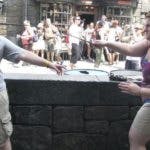Cystic fibrosis (CF) is a disease process that leads to increased mucus buildup in the lungs. As a result, children with CF tend to cough more frequently than a typical child. Coughing leads to increased pressure in the abdomen, which is normal and helps the body create an effective cough. However, because coughing occurs so frequently in children with CF, this pressure in the abdomen is often more than the body is built to accommodate. The increased pressure in the abdomen affects the abdominal musculature and tissues, the bladder, rectum, and the pelvic floor muscles.
Children of any age with CF can present with toileting difficulties, and often these difficulties are related to pee and poop leaks, constipation, or abdominal pain. Because of the frequent coughing and abdominal pressure, the pelvic floor can become too tight in order to fight against the increased pressure, leading to constipation. The pelvic floor muscles can also become too weak after chronic coughing, and then these muscles fail when they attempt to keep pee and poop inside until appropriately reaching a toilet.
Pediatric pelvic floor physical therapy can help children with CF improve their bowel and bladder health. The therapy process will be individualized to the child and will seek to identify all aspects that are contributing to toileting difficulties. Even though as of today, CF is an incurable disease, pelvic floor physical therapy will help your child identify the parts of CF that contribute most to their toileting difficulties and provide them with tools to help alleviate the symptoms they experience related to toileting.
Blog Articles



